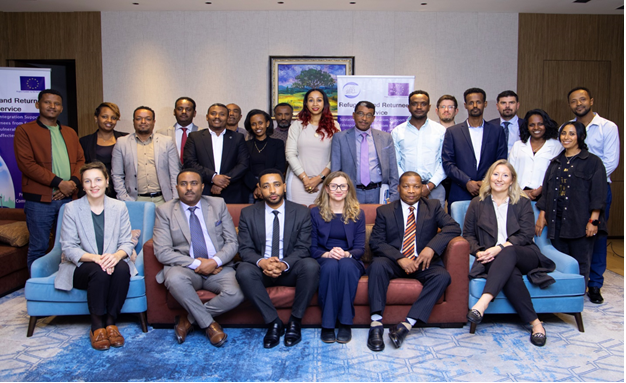|
Ethiopia faces a multifaceted migration challenge, with irregular migration posing significant risks to its citizens. The number of Ethiopian migrants returning home, often under difficult circumstances, has surged in recent years. Many are forcibly repatriated due to their irregular status and limited legal protections in host countries. This complex phenomenon is influenced by various factors, including economic gaps, conflicts, and limited opportunities.
In response to such growing need for return and reintegration support, the Refugee and Returnee Service (formerly ARRA) of Ethiopia, has signed a grant agreement with the European Union (EU) to implement the "Sustainable Reintegration Support to Ethiopians Returning from Europe and Support to Vulnerable Displaced Populations Affected by COVID-19" project. The project is entirely funded by the EU and operational from 2018 to December 2024. Its primary objective was to facilitate the sustainable reintegration of returning Ethiopians and contribute to the development of a national reintegration management system.
Objectives:
Overall objective of the project is to support the sustainable reintegration of Ethiopian returnees from Europe and ultimately contribute to the development of a National Reintegration System for Ethiopia, and to provide ARRA/RRS with the necessary financial, human and technical resources to enhance services for and address the needs of vulnerable displaced populations in Ethiopia facing the COVID-19 pandemic.
The project is implemented by the Refugee Returnees Services (RRS).
More specifically, the project seeks to:
- Facilitate sustainable economic, social and psychosocial individual and community-based reintegration of Ethiopian returnees in communities of return;
- Enhance organisational and technical capacity of ARRA/RRS and relevant stakeholders to implement their mandate on reintegration, and operationalise a sustainable reintegration mechanism/framework in the country; and
- Improve services and infrastructures for displaced populations (returnees and refugees) and their host communities in quarantine or affected by COVID-19 pandemic.
Project Activities:
- Develop and disseminate information booklets regarding post arrival and reintegration support available in Ethiopia.
- Establish a returnees' service desk at the airport.
- Provision of medical, psychological and related short-term rehabilitation support to returnees.
- Provision of post-arrival support to returnees in a shelter.
- Provision of transportation from the airport to the shelter or medical centre (if require immediate medical attention).
- Transportation and provisional accommodation support to all returnees to go to their communities of return.
- Establish short-term housing rent arrangement for those returnees unable to return to their families or communities of origin.
- Increase the number and the quality of quarantine centers, screening centers or isolation centers – for refugees - and the services offered therein, including access to adequate treatments.
- Streamline and apply health IPC (infection prevention and control) protocols in quarantine/isolation/treatment and reception centers, and refugee camps’ health posts.
- Strengthening organizational operations management and coordination for COVID-19 activities.
- Develop, revise and print guiding manual for returnees to establish and operate Small and Medium Enterprises.
- Provide Training of Trainers (ToT) among selected TVETs, Job Creation Agencies, Bureaus of Labour and Social Affairs (BoLSA), Bureaus of Youth and Sports (BOYS), and Micro Finance Institutions staff on training manuals and business manuals, and support the experts to cascade those trainings down to returnees.
- Provide individual occupational skills (basic training expenses) and livelihood and legal and administrative support, including the procurement of necessary equipment, tools, materials, supplies, etc. for each returnee's enterprise based on an approved business plan.
- Reintegration support to selected local development initiatives, including community demand driven small-scale infrastructure projects.
Expected Results:
- Supported reintegration of over 210 returnees from EU+
- Supported reintegration of over 41,540 returnees from KSA
- Conducted community dialogues on the risks of irregular migration reaching over 3,176 community members across 24 migration prone woredas of the targeted regions.
- Completed 23 infrastructure projects creating jobs for over 1,300 returned migrants and local youths operating different micro & small enterprises.
- Helped the Ministry of Labor & Skill (formerly called FUJCFSA & TVETA) to develop 12 training materials and conducted several training workshops
- Provided training equipment to 18 TVET colleges
- Distributed office supplies & ICT equipment to 44 One Stop Service Centers (OSSC) and 6 regional reintegration centers with an aim to improve returnees’ registration, needs assessment, and referrals.
- Played crucial role in the fight against COVID-19 by constructing 18 isolation centers and providing trainings to healthcare professionals on infection prevention and control. 81,507 refugees & host communities benefited from access to clean water in Alemwach, Dilo, Megado, Kebribeya, Tsore & Sherkole refugee camps.
- Set up and is operating a returnee reception service desk at Bole International Airport (BIA)
- Supported the GoE in establishing and operating a central database management system for return and reintegration data.
- Strengthened a total of 7 federal and regional coordination structures & working groups established under the National Partnership Coalition on Migration Secretariat office.
- Initiated construction and operation of a government-led reception and accommodation center, known as the Multi-Purpose Migrant Returnees Assistance Center (MMRAC)
- Established a dedicated permanent office for returnee reintegration.
https://www.youtube.com/watch?v=wS8YmGGu9mw
|






